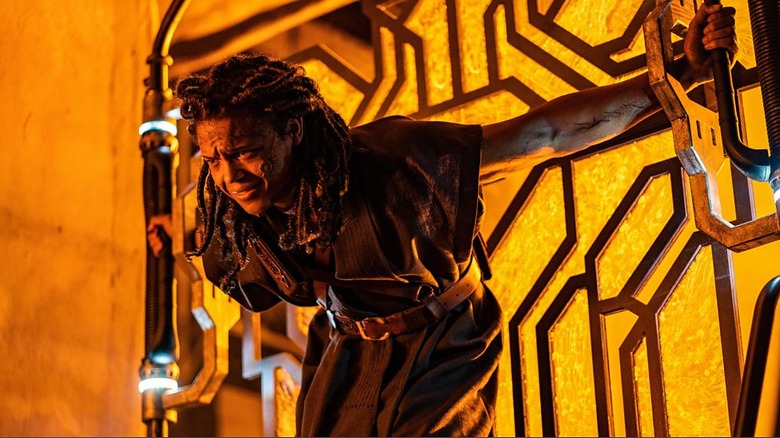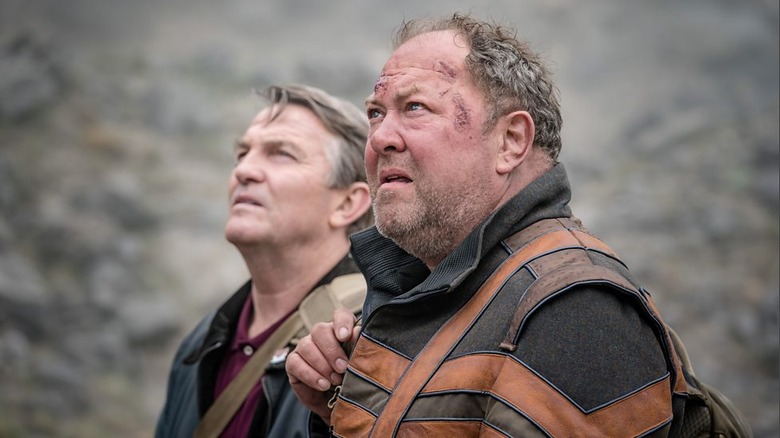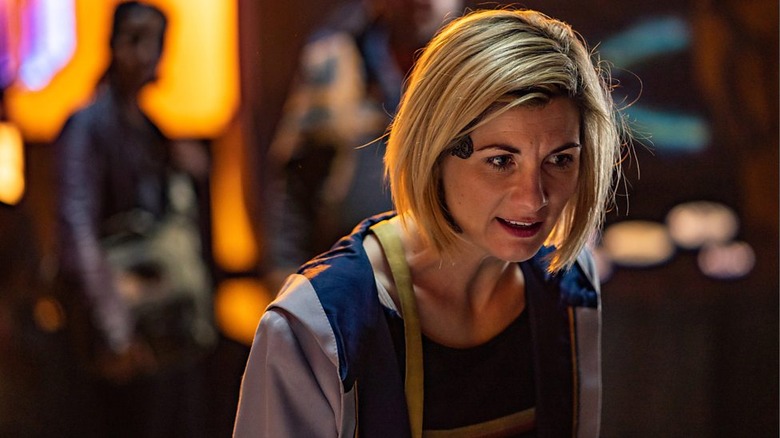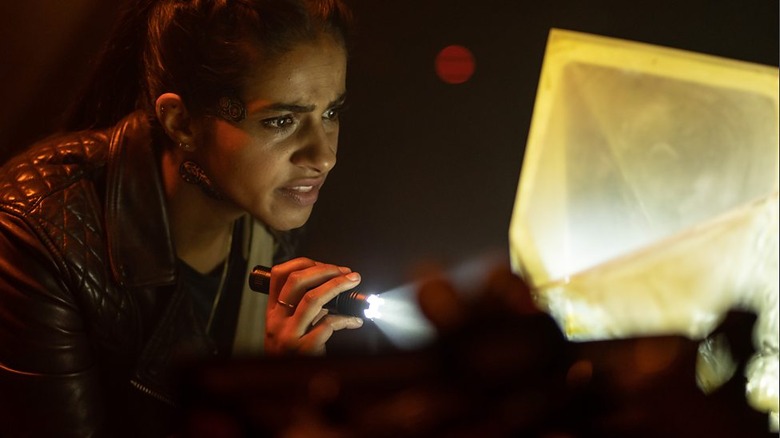The 'Doctor Who' Season Finale Is A 'Battle' To Maintain The Show's Momentum
There's a line from Peter Capaldi's run as the Doctor that I keep going back to during this inspiring, but uneven, 11th season of Doctor Who: "Well to be fair, they cut out all the jokes!" This episode, and to an extent this season, could have done with a couple of laughs.
While Jodie Whittaker has injected new life into the show, uttering every line with a twinkling bravado and generally being the best, her strong performance has barely been enough to make up for what has been just an okay season. I had hopes for new showrunner Chris Chibnall to right the ship after Steven Moffat steered it into the eye of the hurricane, but it seems that Chibnall has taken the series to the most placid waters. Except for the historical episodes, this season of Doctor Who has been, for the most part, kind of bland. The show had only started to feel properly like Doctor Who — after treading around familiar monsters and nods to the show — in the past four episodes, which took the season (and in last week's case, the show) to an all-time high. It's no surprise that those four episodes were each penned by a different writer who wasn't Chibnall. But the showrunner took to the pen again for the season finale, "The Battle of Ranskoor Av Kolos," and as a result, we end the season on an underwhelming note.
True Calling
Two religious figures with markings on their faces set about on a religious task, with the younger, Delph (Percelle Ascott) magically creating a rock formation from thin air under the woman's (Phyllis Logan) tutelage. But they're interrupted by a sinister figure emerging from a ball of blue light.
Roughly 3,000 years later, the Doctor answers a distress signal emanating from that same planet — our titular Ranskoor Av Kolos, which literally translates to "disintegrator of the soul" if you couldn't get more foreboding. Team TARDIS land in an abandoned ship armed with only their wits and neural protectors to block the planet's mood-distorting powers. But they are met with an armed Robert Baratheon, a.k.a. Mark Addy. Confused and suspicious, the man has spent so long on the reality-distorting planet that he has forgotten his own identity, which the Doctor soon fixes by handing him a neural balancer. Reoriented, he introduces himself as Paltraki and reveals that he was on a mission on this planet to retrieve a mysterious object when his crew was captured. They're being held hostage by the woman from the beginning and, dun dun dun, Tim Shaw. That's right, the toothy blue baddie from the first episode is back, and he's been passing himself off as a god to the duo who lived on this planet. The Doctor's attention is immediately grabbed, as is Graham's, who — still aching from his encounter with a phantom Grace last episode — wants revenge.
The Arrival of a Familiar Face
Team TARDIS arrive at a great battlefield covered in mist and destroyed ships, at the center of which is a floating black oblong spacecraft that looks like a more steampunk version of the ship from Arrival. The Doctor unpacks her gadgets which include a few grenades, prompting Ryan (and me) to dubiously ask, "What happened to never any weapons?" This moment, as well as Paltraki's unfamiliarity with Earth, is another instance of Chibnall distancing himself from previous seasons of Doctor Who in a way that irks me. Sure, the Doctor has used weapons before (remember when the shot of Matt Smith with a gun caused chaos in the Whovian community?) and sure, Doctor Who is creating new stories and universes all the time. But it's moments like these where this season of Doctor Who feels increasingly unfamiliar, when the last few episodes were so good about making it feel like the show I loved again. But I don't blame Chibnall for wanting to create his own mythology and start this era totally anew. But if he wants to build a new era for Doctor Who, does it have to be with the Stenza?
Tzim-Sha was one of the weakest parts of the season 11 premiere, and yet he and his dull legion of Cyber Bots are back to supposedly end the season with a bang. While it is interesting to have the Doctor deal with the ramifications of her actions — in this case, her mercifully sending Tzim-Sha back to his home planet backfired into the Stenza warrior hatching a 3,000 year plot to capture the Earth — I just don't find this toothy Big Bad to be compelling. Right down to his Power Rangers-inspired look and his generic mechanical voice, Tzim-Sha is one of the most boring monsters in the Doctor Who canon and I hope that this will be the last we see of him.
However the Ux, the powerful religious duo we met at the beginning, are interesting new inductees into the Doctor Who universe. Introduced as a unique species with a millennia-long lifespan and only comprised of two people, they are so ultra-powerful (they can bend all of reality??) that it's a little ridiculous that this is the first we're hearing about them. I'd be interested in seeing them return, even if their characterization as gullible devotees leaves something to be desired.
"I've Got a Ghost Monument"
After being absent for nearly all of this season, the TARDIS finally gets something to do. And I like the Doctor's new fond way of referring to it as her "ghost monument," because in a way, that is the most accurate way of describing this icon of pop culture. Faces and companions may change, but the TARDIS always stays the same: as a blue police box that, now divorced of its 1960s context, is inextricably tied to Doctor Who. In the context of the episode, the Doctor uses the TARDIS' time vortex energy to help the Ux return the planets that have been captured by Tim Shaw and put in stasis — giving us a fun nod to season 1 with the mention of the Slitheen, and even giving us our first almost-"It's bigger on the inside moment" (the awestruck Delph never actually says those words, but I'll take it).
This episode's plot is not unluke to season 4's "The Stolen Earth"/"Journey's End" — planets are captured from their orbit and the very fabric of the universe is threatened — but lacks Russel T. Davies' entertaining camp and character-driven twists. Despite the powerful arc that Graham goes through (Bradley Walsh delivers a stunning performance, and is the breakout after Whittaker this season) with refusing to take revenge on Tzim-Sha for Grace's death, all the other character moments feel a little half-baked. And after all the build-up to a possible universe-destroying climax, "The Battle of Ranskoor Av Kolos" turns out to be less of a battle than it is a 5-minute skirmish. It's a solid, but underwhelming, end to season 11 with so much potential that remains unacted on. But I remain hopeful that that this potential still lies there, and that with the coming season (out later in 2020) will be even stronger than before. This is just the beginning of the battle, after all.
Tidbits in Time and Space




